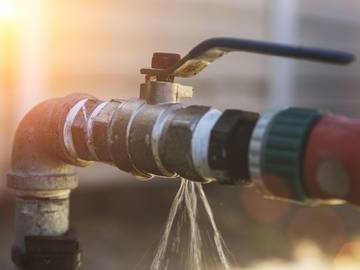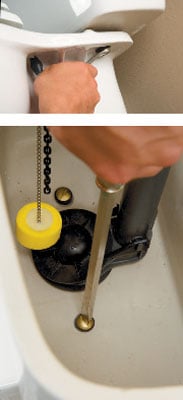The 5 Common Water Leak Triggers
The 5 Common Water Leak Triggers
Blog Article
We have come across the article about Where to Find Water Leaks down the page on the net and felt it made good sense to talk about it with you over here.

"Be careful of little costs. A small leakage will sink a wonderful ship." - Benjamin Franklin.
He couldn't have been more best because water leaks in our houses cause a waste of sources, boosting our water expenses. This increase may appear minimal at first, it can lead to significant expenses that can break your financial institution. Apart from an increase in expenses, water leakages additionally trigger unwanted organic development, architectural damage, as well as even electrical risks.
If you have a water leakage isn't always very easy due to being not able to see many of the pipework in your residence, figuring out. If you have had a boost in your water expenses lately, noticed water discolorations on wall surfaces as well as ceilings, smelt poor odor, etc. You may wish to consider asking for plumbing services to get it took a look at.
There are several sources of water leaks, and we have assembled the common factors below. Inspect to see if you have actually had related issues in your home recently.
Blocked drains pipes
Food bits, dirt, and grease can cause blocked drains pipes and also obstruct the flow of water in and out of your sink. Boosted stress within the seamless gutters can end as well as create an overflow up fracturing or breaking pipelines if undealt with. To avoid blocked drains in your house, we recommend you to prevent pouring fragments away and normal cleansing of sinks.
High water pressure
You noticed your home water stress is more than typical but then, why should you care? It runs out your control.
It would be best if you cared due to the fact that your ordinary water pressure need to be 60 Psi (per square inch) as well as although your residence's plumbing system is designed to hold up against 80 Psi. A boost in water stress can place a strain on your home pipes and also result in fractures, or even worse, ruptured pipelines. If you ever before notice that your home water pressure is higher than usual, get in touch with an expert regarding managing it.
Rust
As your pipework ages, it gets weaker as well as much more prone to corrosion after the constant flow of water with them, which can eat away at pipelines as well as trigger cracks. A noticeable sign of corrosion in your house plumbing system is staining as well as although this could be difficult to find because of most pipes hidden away. We advise doing a constant examination every few years and transform pipes once they are old to make certain an audio plumbing system
Deteriorated pipeline joints
Pipe joints are the parts of our plumbing system where the pipes link. They are the weakest factor of our plumbing system. Consequently, they are much more prone to deterioration. It is essential to note that although pipelines are designed to hold up against stress and also last for a while, they weren't created to last for life; therefore, they would deteriorate in time. This damage can result in splits in plumbing systems. A typical indicator of harmed pipeline joints is too much noise from faucets.
Busted seals
An additional reason for water leakages in homes is broken seals of home appliances that make use of water, e.g., a dishwasher. When such home appliances are installed, seals are set up around water adapters for very easy passage of water via the machine. For this reason, a busted seal can create leak of water when being used.
With little or no expertise of plumbing, comprehending your house's plumbing system enough to deal with a few of these problems (without consequence) can be a hassle. Get in touch with plumbing experts in Pittsburgh, Providence, Rochester, and also environ today, and they'll make those issues vanish.
He couldn't have actually been a lot more appropriate because water leakages in our homes result in a waste of sources, raising our water costs. If you have had a rise in your water costs recently, discovered water discolorations on wall surfaces and ceilings, smelt poor odor, etc. A boost in water stress can put a stress on your home pipes and also lead to cracks, or worse, burst pipes. One more cause of water leakages in homes is broken seals of house devices that use water, e.g., a dish washer. When such appliances are installed, seals are set up around water ports for simple flow of water via the equipment.
WHAT ARE THE COMMON PLACES TO DETECT WATER LEAKS?
There’s no need to panic if you don’t own a leak-detecting tool. There are still some effective traditional techniques for detecting a water leak in your house. We’ve discussed some common spots in your house where leaks are most likely to occur throughout this section. Let’s take a look!
BOILER OR WATER TANK
Your boiler or water tank valves are pretty prone to water leakage. So, check the boiler valves, and you might be able to detect the leak. But, if there’s no water escaping from the valves, you might have a slow leak. Thus, look for water spots on the floor or try to detect any hissing sound coming from the valves.
However, if you own a central healing water boiler, the leak can indicate some severe water damage. Under such circumstances, don’t try to fix the leak yourself; contact a professional as soon as possible.
TOILETS
Considering how frequently we use toilets, having a leaky toilet is quite common. Fixing a minor water leak is pretty straightforward, and you can do it yourself without hiring professional help. For instance, changing the washer or improving the drainage pipe usually doesn’t require guidance from a professional plumber.
However, if you ignore a toilet leak or fail to detect it in time, it can overflow the toilet, causing severe property damage. Thus, if the situation is dire, it’s best to hire emergency plumbing services and get the water leak in your toilet fixed immediately.
SHOWERHEADS
Like toilets, showerheads are frequently used and are more prone to water leakage. Old showerheads wear down over time, leading to leaking shower pipes. You can detect such leaks by the drop in the water pressure of the showerheads.
You can clean your showerhead or if that doesn’t work, replace the pipe supplying water to the showerhead with a new pipe. It’s pretty straightforward, so you might not need to hire professional plumbers.
https://wpplumbing.com.au/blog/how-to-detect-a-water-leak-in-your-home

As a fervent reader on Reasons for Water Heater Leaks, I assumed sharing that excerpt was sensible. Enjoyed reading our piece of writing? Please share it. Help another person discover it. Thank you for going through it.
Hot water issues? Connect now. Report this page